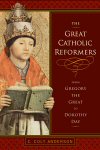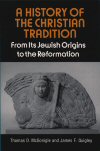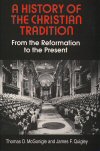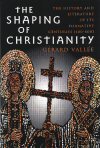Paulist Press Church History Collection (4 vols.)
Digital Verbum Edition
Overview
Explore the history of Catholicism from the first century to the present. The Shaping of Christianity closely examines the first four centuries of “the Christian movement” as it developed into a major world religion. The two-volume A History of the Christian Tradition surveys the entire history of Christianity, from its Jewish origins all the way through the pontificate of Pope John Paul II. And C. Colt Anderson’s The Great Catholic Reformers highlights the careers of several remarkable men and women who have contributed to the purification and renewal of the Bride of Christ from Pope Gregory the Great in the sixth century to Dorothy Day in our own time. Rich with all the poignancy of human drama, The Paulist Press Church History Collection offers an in-depth look at Catholicism’s origin, growth, development, and change throughout the last two thousand years.
In the Verbum editions, these volumes are enhanced by amazing functionality. Important terms link to dictionaries, encyclopedias, and a wealth of other resources in your digital library. Perform powerful searches to find exactly what you’re looking for. Take the discussion with you using tablet and mobile apps. Your software brings the most efficient and comprehensive research tools together in one place, so you get the most out of your study.
Take a look at the Popular Patristics Series, Part 1 and Part 2, for more insight into the early Church.
Key Features
- Surveys the development of the Catholic Church from the first century to the present
- Provides in-depth examination of the first four centuries of Christianity
- Celebrates the lives of several reformers in Church history
Product Details
- Title: Paulist Press Church History Collection
- Publisher: Paulist Press
- Volumes: 4
- Pages: 1,062
- Christian Group: Catholic
- Resource Type: Histories
- Topic: Church History
Individual Titles
- The Great Catholic Reformers: From Gregory the Great to Dorothy Day by C. Colt Anderson
- A History of the Christian Tradition, vol. 1: From Its Jewish Origins to the Reformation by Thomas McGonigle and James F. Quigley
- A History of the Christian Tradition, vol. 2: From the Reformation to the Present by Thomas McGonigle and James F. Quigley
- The Shaping of Christianity by Gérard Vallée

The Great Catholic Reformers covers the careers of Pope Gregory the Great, Peter Damian, Bernard of Clairvaux, Clare of Assisi, Catherine of Siena, Jean Gerson, Jan Hus, Gasparo Gontarini, John Henry Newman, and Dorothy Day. This diversity of reformers in our tradition suggests that legitimate reform within the Catholic Church can operate from different spiritualities, employ either gentle or harsh critiques, use secular or canon law to enforce discipline, and begin with lay men and lay women as well as with members of the religious or of the clergy.
The Second Vatican Council stated that the Church is always in need of purification and renewal, but it did not attempt to describe how this process takes place. C. Colt Anderson presents lessons on Church renewal from 10 of the most significant reformers in Church history. By looking at models from a variety of historical and cultural contexts, Anderson describes how reform takes place, what it looks and sounds like, and how it can be effective.
By offering these diverse models, The Great Catholic Reformers seeks to encourage every Catholic to take up the difficult task of reform and to provide them with examples that suit their own temperaments. It also aims at broadening tolerance for people who follow different approaches to reform.
C. Colt Anderson is dean of the Graduate School of Religion at Fordham University. A church historian and theologian, Anderson holds a PhD from Marquette University. He was appointed by the Vatican to the Apostolic Visitation of the US Seminaries and is the recipient of the 2008 Catholic Press Association of the United States and Canada Book Award for history. He is the author of Christian Eloquence.

A History of the Christian Tradition is a comprehensive overview of the institutional history and the theological issues involved in the development of Christianity from its roots in the Jewish religion through the sixteenth century Reformation. In 25 chapters the authors survey the principal movements that shaped and nurtured Christian consciousness. They show how the first, small communities developed into an institutional Church, and they trace the changing face of the Church through the first centuries and the Middle Ages. But Thomas McGonigle and James F. Quigley also show how Christian faith emerged, grew and changed over the same period. They evaluate the impact of the great Christian teachers—Jesus and Paul, Augustine, Benedict, Thomas Aquinas, and Luther.
Thomas D. McGonigle, OP, is vice president, academic dean, and associate professor of spirituality at the Catholic Theological Union in Chicago.
James F. Quigley, OP, is an associate professor in the Department of Religious Studies and special lecturer in the graduate history program at Providence College.

This volume takes you through the momentous events of the post-Reformation Christian world to the dawning of the ecumenical movement in the late twentieth century. Beginning with an overview of Protestant Europe, Thomas McGonigle and James F. Quigley examine the missionary ventures in the sixteenth and seventeenth centuries, the establishment of churches in the New World, and the struggles between rationalism and faith during the Enlightenment and beyond. Notice is also given to developments in the Orthodox churches and the story of the Jews in Christian Europe. The history concludes with renewal movements, culminating in the Second Vatican Council and the pontificate of Pope John Paul II.
Thomas D. McGonigle, OP, is vice president, academic dean, and associate professor of spirituality at the Catholic Theological Union in Chicago.
James F. Quigley, OP, is an associate professor in the Department of Religious Studies and special lecturer in the graduate history program at Providence College.

Gérard Vallée presents this introduction to the formative centuries of Christianity, written for those who are new to the subject. The Shaping of Christianity surveys the development of the Christian movement in the context of the political, social, and religious milieux of the second through the eighth centuries. Vallée incorporates primary sources, charts, a map, and numerous helpful appendixes.
He explores such topics as:
- Cultural and religious legacies of Greek society and Judaism
- The establishment of Christianity as the religion of the Empire
- The division of the Empire and growing split between East and West
- Early heresies and dissident factions within the church
- The practice of Christian life
- Christological and other theological controversies
- The formation of orthodoxy and the role of early church councils
- Patristic literature and history
The Shaping of Christianity not only facilitates a better understanding of the patristic era, it also illuminates how the developments of the past give insights into Christian life and practice in the present.
Gérard Vallée is professor emeritus of religious studies at McMaster University in Hamilton, Ontario.
Key Features
- Surveys the development of the Catholic Church from the first century to the present
- Provides in-depth examination of the first four centuries of Christianity
- Celebrates the lives of several reformers in Church history
Product Details
- Title: Paulist Press Church History Collection
- Publisher: Paulist Press
- Volumes: 4
- Pages: 1,062
- Christian Group: Catholic
- Resource Type: Histories
- Topic: Church History